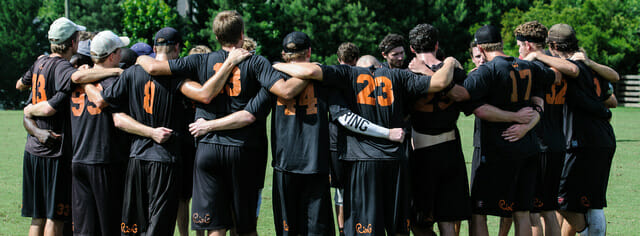Raleigh is the latest city to unify its Men's Club scene, as Ring of Fire becomes the area's only elite team and plans a developmental second team to build towards the future.
June 2, 2014 by Charlie Eisenhood in News with 27 comments

Following in the footsteps of cities like Seattle and Houston, Raleigh-Durham becomes the latest metropolitan area to unify its Men’s elite club scene as Ring of Fire — the long-standing club team out of Raleigh — has combined with other area teams, including Cash Crop, to be the only major men’s team in the city.
Ring of Fire has been a consistent Nationals qualifier over the past two decades, only missing the tournament once in the last 21 years. But after a disappointing 11th place finish last year, the team is looking to do more than just compete at the Club Championships.
“We’re going to finally have the talent in one spot,” said new Ring coach Mike DeNardis, who just completed another season of coaching the UNC men’s team. “There’s never really been one unified North Carolina team, for at least the last ten years.”
Cash Crop, one of a number of teams that has siphoned some talent away from Ring in years past, has disbanded and its leaders — including Ben Dieter and Joey Cretella — have joined the leadership core of Ring of Fire’s 2014 team. They are joined by Brian Casey, Dennis Tarasi, and Josh Mullen. Along with DeNardis, those players have planned tryouts and the team’s season, though the team will elect captains after the final roster is announced later this month.
Tully Beatty, a UNC Wilmington assistant coach and long-time coaching presence in North Carolina, will also join the coaching staff of Ring this season.
Ring will hold a single area tryout and, like Seattle and New York, divert players that don’t make the top team to a second-tier, developmental team.
That team will be comprised largely of younger players that the Ring leadership hopes to develop into future stars. “Our practices are going to be structured very similarly; our sets are going to be structured very similarly,” said DeNardis. That way, he said, some players could be brought up at the end of the season and plug right into Ring’s offensive and defensive schemes.
North Carolina has always played host to a lot of strong (and often conflicting) ultimate personalities, so this merger marks a major step in terms of the community’s cohesion. “I think Ring for a long time had a certain personality that rubbed people the wrong way, but I think that’s gone by the wayside now,” said DeNardis.
A lot of turnover this season (10+ players will not return from last season, mostly due to moving) plus the major structural changes (plus the addition of focused coaching) could make for a very different Ring team in 2014. DeNardis says it’s all for the better.
“I think the offense will be more consistent,” he said. “They’ve tended to be kind of a hucking team.”
Regardless of what happens on the field, bringing together the elite men’s scene has its roots in a simple, common goal.
“People just want to win,” said DeNardis. “And I think they’re coming together at the end of the day because of that.”